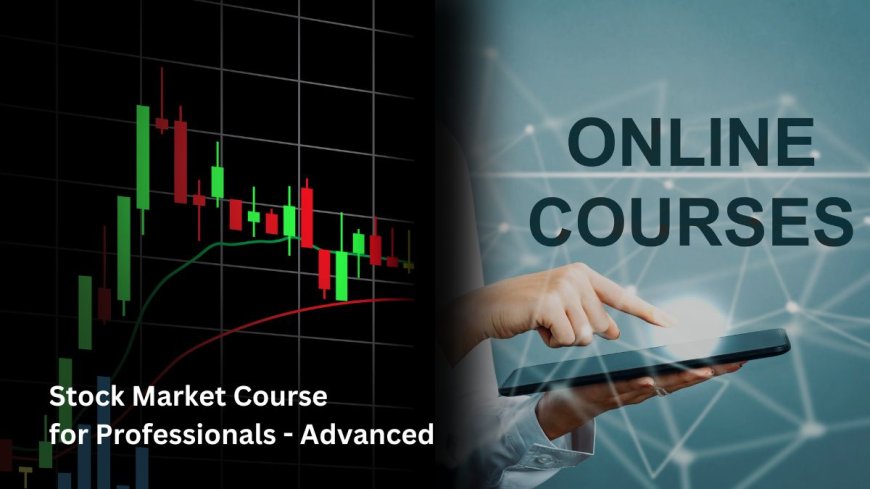How to Build a Trading Career After Completing Online Courses
The reality is, completing an online trading course is just the beginning. A sustainable trading career involves discipline, self-awareness, constant learning, and a strategic roadmap. Whether you want to trade for yourself, work with a brokerage, or become an educator, the path after learning is just as crucial as the learning itself.

So you've completed a trading course online. You've learned how markets work, explored strategies, dived into technical analysis, and even practiced on demo accounts. But what now? How do you transition from a learner to an active traderor better yet, build a career in trading?
The reality is, completing an online trading course is just the beginning. A sustainable trading career involves discipline, self-awareness, constant learning, and a strategic roadmap. Whether you want to trade for yourself, work with a brokerage, or become an educator, the path after learning is just as crucial as the learning itself.
In this final article of our series, well explore how to build a trading career after completing online courses, and outline actionable steps that help turn knowledge into real progress.
1.Define Your Trading Style and Goals
Once youve completed your course, take time to reflect:
-
Are you more comfortable with intraday, swing, or positional trading?
-
Do you prefer technical charts, news-based trades, or derivatives like options?
-
Are you trading for supplemental income, full-time freedom, or as a side hustle?
A career in trading doesnt look the same for everyone. Your personal risk appetite, time availability, and financial goals will determine your journey.
Tip: Dont force yourself into intraday trading if your job doesnt allow screen time. Build a system that aligns with your reality.
2.Start With Paper Trading or Small Capital
Just because youve completed a course doesnt mean you should jump into full-time live trading with your savings.
Begin by:
-
Practicing in demo accounts
-
Using paper trading tools to implement strategies
-
Starting live with small capital, using strict risk control
This phase allows you to understand real-world volatility, emotional discipline, and market behavior without risking large sums.
3.Create a Trading Plan
A trading career without a plan is like driving without a map. Your plan should include:
-
Your preferred asset class (stocks, options, forex)
-
Entry and exit rules
-
Risk management parameters
-
Capital allocation method
-
Tools and platforms youll use
Document it clearly. Keep it flexible enough to evolve, but structured enough to avoid impulsive decisions.
4.Track and Analyze Every Trade
Start maintaining a trading journal from day one. For every trade, note:
-
Why you entered
-
What you observed in the market
-
Entry and exit points
-
What worked, what didnt
-
Emotional state during the trade
Reviewing your journal weekly or monthly will help you spot patternsboth in the market and in yourself.
Many online courses emphasize this practice, but few traders actually do it. Its a habit that separates amateurs from professionals.
5.Build Your Personal Brand (Optional but Powerful)
If you're looking to eventually work in a trading firm, become a financial content creator, or build a freelance reputation, start creating content based on your learning.
This could be:
-
A YouTube channel sharing trade analysis
-
A blog documenting your trading journey
-
A LinkedIn page showcasing your learning and trades
-
Social media presence in trading communities
Consistency builds credibility. You never know who might notice your workemployers, mentors, or future clients.
6.Pursue Relevant Certifications
If youre considering a career in the trading or financial services industry, online courses are a good foundationbut professional certifications help legitimize your skill.
You can pursue:
-
NISM (National Institute of Securities Markets) certifications in India
-
CMT (Chartered Market Technician) if youre inclined toward technical analysis
-
NSE Academy certified modules
These credentials enhance your resume if you want to apply for roles like:
-
Technical analyst
-
Trading desk assistant
-
Equity advisor
-
Proprietary trader
7.Join a Trading Community or Mentorship Group
Being part of an active trading group can:
-
Keep you motivated
-
Offer regular trade ideas and analysis
-
Help you stay updated with market news
-
Allow you to learn from others mistakes and successes
Many online trading educators offer lifetime access to Telegram/Discord groups. Use them not just to copy trades but to grow through shared experience.
If possible, seek a one-on-one mentor who can review your trades, hold you accountable, and guide your progression.
8.Explore Career Paths Beyond Self-Trading
Not everyone has to be a full-time trader to build a career in this space. Other paths include:
-
Content Creation: Writing blogs, running YouTube channels, creating courses
-
Financial Writing or Journalism: Analyzing markets and writing for finance publications
-
Portfolio or Investment Management: With proper licensing, you can help others manage money
-
Brokerage Roles: Work in customer support, advisory, or research roles in brokerage firms
Your online course knowledge can open doors beyond just placing trades.
9.Keep Upgrading Your Knowledge
Markets change. Strategies evolve. A trader's learning never really stops.
After your initial course:
-
Take advanced modules (like options strategies, algo trading, or risk models)
-
Subscribe to market newsletters and reports
-
Attend webinars or online workshops
-
Read trading books and autobiographies of successful traders
The more perspectives you gain, the better youll handle different market conditions.
10.Focus on Psychology and Discipline
The biggest battles in trading happen in the mind, not on the charts.
Even with the best strategy, if you:
-
Overtrade out of greed
-
Cut winners too early due to fear
-
Revenge trade after losses
youll struggle to stay consistent.
Invest in books, courses, and videos focused on trading psychology. Develop emotional discipline, patience, and clarity. Your mindset will often be the deciding factor in your trading career.
Conclusion
Completing a trading course online is an excellent first stepbut its just the beginning of your journey.
Building a trading career requires a balance of skill, experience, mindset, and long-term commitment. Whether you want to be an independent trader, work in the finance industry, or educate others, your online course knowledge gives you a powerful head start.
Take it one step at a time. Focus on learning, not just earning. And rememberconsistency, discipline, and reflection will always matter more than shortcuts or flashy wins.
Start trading smart. Build your edge. And keep growing.







































